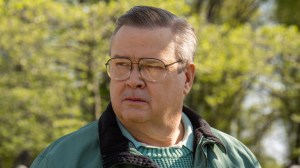The long-running zombie drama gets a whole new beginning as The Walking Dead is once again can’t-miss, must-see TV with Season Nine.
Videos by ComicBook.com
Just three episodes into Season Nine, The Walking Dead is back to being the best show on television.
18 months after Rick Grimes (Andrew Lincoln) defeated and imprisoned dethroned Savior leader Negan (Jeffrey Dean Morgan), Rick is shepherding a newly-established network of communities and their respective survivors into the future as they work together to rebuild civilization.
“We’re building. We’re growing… we’re making a new beginning,” says Rick, who now works laboriously to fulfill the idyllic future envisioned as the dying wish of late son Carl (Chandler Riggs).
Having emerged as a pseudo-celebrity for his wartime efforts and subsequently ushering in an era of peacetime, Rick has since turned his attention towards erecting a bridge that will literally and symbolically link all the communities — Alexandria, the Hilltop, the Kingdom, Oceanside, and the Sanctuary — while his closest allies, including formidable Hilltop leader and new mother Maggie (Lauren Cohan) and former right-hand-man Daryl (Norman Reedus), have yet to fully embrace working with enemies-turned-strained allies the Saviors.
Character-Driven Conflict
Meanwhile, Rick has delegated many of his at-home duties to lover Michonne (Danai Gurira), who has effortlessly and elegantly stepped into the role of a fair-but-firm co-leader poised to one day assume full control of Alexandria.
The katana-wielding warrior is dutifully developing a concise charter that will lay out rules for all to abide if they’re to operate side-by-side in this newly-forged makeshift society meant to give way to a better-than-before world — but their in-the-works future is at risk of crumbling before it can begin as result of the conflicts that come with trying to unite wildly different tribes, each possessing their own unique perspective of the increasingly decaying world around them and their own loudly-expressed ideas on developing the new world.
The Walking Dead is now a political drama viewed through the lens of a zombie apocalypse, turning greater focus to more complex character-driven conflict that is at its strongest since the Frank Darabont-led first season.
Complicated Relationships
While the survivors of this world gone bye have long been under threat of being torn apart by teeth or bullets, “fight the dead, fear the living” has given way to a danger more philosophical and challenging in nature: while characters do come to blows physically and weapons are readied, raised, and aimed, there’s a much greater — and far more interesting — focus on dealing with problems between people that can’t be solved by gun or knife or sword.
Tensions are at an all-time high as factions undergo a strife raised primarily by the withering Sanctuary, who rely on outside assistance for survival. A revolving door leadership sees Daryl, Michonne, and Kingdom “queen” Carol (Melissa McBride) oversee daily operations at the Sanctuary, which only widens the clear rift between Rick and a distant Daryl.
“It’s complicated,” Rick says of the strained relationship, hurt in part by Rick’s unilateral decision to spare Negan and Daryl’s resistance to the new status quo that sees the loner bowman now having to make nice with those he views undeserving of partaking in the future that Rick believes “belongs to all of us now.”
“Why do they get this future, and Glenn don’t? Or Abraham? Or Sasha?” Daryl argues, begrudgingly falling in line with imposed civility but characteristically acting out when the emotions on his sleeve get the better of him.
The Calm Before
Sides are chosen as all camps struggle to adapt to this new way of life to varying degrees, with dissension fueled by shit-stirrer Saviors Justin (Zach McGowan) and Jed (Rhys Coiro), forcing good-guy Saviors Alden (Callan McAuliffe) and Laura (Lindsley Register) to play peacemakers as they attempt to ensure the Sanctuary and its denizens are treated fairly.
The Sanctuary has been wholly disarmed as part of an agreed-upon condition of their surrender, and while some have made peace and accepted their place in the scheme of things — trading fuel and labor in exchange for much-needed food and supplies from well-off communities like a built-up Hilltop — others feel dangerously disenfranchised, some still showing loyalty to he-who-must-not-be-named, who now acts as the Monster in the Basement of Alexandria.
That controversy boils over when a turn of events leaves the Saviors’ personal safety feeling threatened, leaving Rick and the other community heads having to quell a potential rebellion before it starts.
Genuine Human Drama
This is when The Walking Dead is at its best: when it raises hard-hitting philosophical questions and dilemmas with no easy answers before forcing the characters to answer those questions and make those decisions — and then subsequently living with, or paying for, the consequences of those choices.
With the world of The Walking Dead richer and more compelling than ever before, Season Nine delivers the kind of meaty and genuine human drama the show has lacked in recent seasons, trading the bombastic action of Season Eight’s All Out War and its accompanying melodrama for a taut and engaging storyline that is bolstered by natural, lifelike dialogue and anchored by strong, fleshed-out performances from its expansive cast — namely series veterans Lincoln, Reedus, McBride, Cohan, and Gurira, who spend more time together this front half-season than they have in recent runs.
A Satisfying Payoff For Committed Viewers
Rebuilt almost entirely from the ground up, the semi-rebooted new season delivers what longtime fans expect while bringing its own flourishes to Robert Kirkman’s comic book material that, more than ever, acts as more of a loose guideline — allowing the show to provide an all-new, all-different experience for comic book readers while remaining faithful to the spirit of the beloved comics.
There’s at least one shock per episode — some big, others small, but enough to please or surprise dedicated viewers — returning The Walking Dead to its glory days where every episode was gripping and unpredictable.
Not Too Far Gone
The world again feels lived-in and raw, bringing back the same horror-tinged realness the show had in its inaugural season under original showrunner Darabont. Now, under newly minted Season Nine showrunner Angela Kang — a veteran writer-producer on the series since its second season in 2011 — The Walking Dead feels like a brand new show, refreshed and rejuvenated to deliver extremely satisfying viewing for fans both new and old.
As all sides try to build a future — for themselves, for their loved ones, for the generations to come — The Walking Dead has similarly course-corrected, making for a final run of episodes for exiting leading man Andrew Lincoln that could go down as some of the series’ best ever.
This front half-season includes a jaw-dropping third episode that delivers some of the finest mystery and drama the show has ever seen in its eight-year run, making for a Walking Dead that will again make you count down to Sunday nights.
A New Beginning
In building the community bridge and forging the charter, Michonne says the survivors “need to build something that’s bigger than any one of us.” And while the loss of lead Andrew Lincoln and his Rick Grimes seems unfathomable, this new direction for the show can weather the loss — it’s only a shame Lincoln, who has long tethered the show as its beating heart, steps away just as the series gets a much-needed refresher and is the best it’s been since Season Five.
“It’s not the end of the world anymore,” says undeterred optimist Aaron (Ross Marquand). “It’s the start of a whole new one.” The same is true for The Walking Dead, which gets its new beginning — and feels more alive than ever.
The Walking Dead Season Nine premieres Sunday, October 7 on AMC.









